(完整版)小学英语形容词的比较级
- 格式:pdf
- 大小:163.02 KB
- 文档页数:9
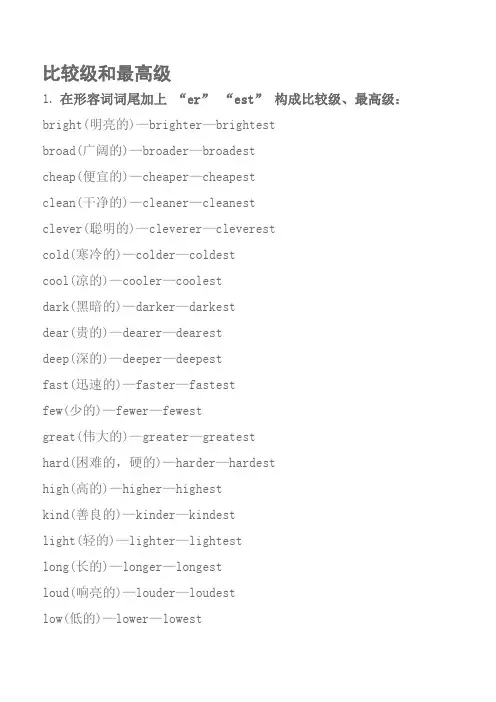
比较级和最高级1.在形容词词尾加上“er”“est”构成比较级、最高级:bright(明亮的)—brighter—brightestbroad(广阔的)—broader—broadestcheap(便宜的)—cheaper—cheapestclean(干净的)—cleaner—cleanestclever(聪明的)—cleverer—cleverestcold(寒冷的)—colder—coldestcool(凉的)—cooler—coolestdark(黑暗的)—darker—darkestdear(贵的)—dearer—dearestdeep(深的)—deeper—deepestfast(迅速的)—faster—fastestfew(少的)—fewer—fewestgreat(伟大的)—greater—greatesthard(困难的,硬的)—harder—hardesthigh(高的)—higher—highestkind(善良的)—kinder—kindestlight(轻的)—lighter—lightestlong(长的)—longer—longestloud(响亮的)—louder—loudestlow(低的)—lower—lowestnew(新的)—newer—newestpoor(穷的)—poorer—poorestquick(快的)—quicker—quickestquiet(安静的)—quieter—quietestrich(富裕的)—richer—richestshort(短的)—shorter—shortestslow(慢的)—slower—slowestsmall(小的)—smaller—smallestsmart(聪明的)—smarter—smartestsoft(柔软的)—softer—softeststrong(强壮的)—stronger—strongestsweet(甜的)—sweeter—sweetesttall(高的)-taller-tallestthick(厚的)—thicker—thickestwarm(温暖的)—warmer—warmestweak(弱的)—weaker—weakestyoung(年轻的)—younger—youngest2.双写最后一个字母,再加上“er”“est”构成比较级、最高级:big(大的)—bigger—biggestfat(胖的)—fatter—fattesthot(热的)—hotter—hottestsad(伤心的)—sadder—saddestthin(瘦的)—thinner—thinnestwet(湿的)—wetter—wettestmad(疯的)—madder—maddest3.以不发音的字母e结尾的形容词,加上“r”“st”构成比较级、最高级:able(能干的)—abler—ablestbrave(勇敢的)—braver—bravestclose(接近的)—closer—closestfine(好的,完美的)—finer—finestlarge(巨大的)—larger—largestlate(迟的)—later—latestnice(好的)—nicer—nicestripe(成熟的)—riper—ripestrude(粗鲁的)—ruder—rudestsafe(安全的)—safer—safeststrange(奇怪的)—stranger—strangestwide(宽广的)—wider—widest wise(睿智的,聪明的)—wiser—wisest white(白的)—whiter—whitest4.以字母y结尾的形容词,把y改为i,再加上“er”“est”构成比较级、最高级:busy(忙碌的)—busier—busiestdirty(脏的)—dirtier—dirtiestdry(干燥的)—drier—driestearly(早的)—earlier—earliesteasy(容易的)—easier—easiestfriendly(友好的)—friendlier—friendliest fun—funnier—funniesthappy(开心的)—happier—happiesthealthy(健康的)—healthier—healthiestheavy(重的)—heavier—heaviesthungry(饿的)—hungrier—hungriestlazy(懒惰的)—lazier—laziestlucky(幸运的)—luckier—luckiestnaughty(调皮的)—naughtier—naughtiestnoisy(嘈杂的)—noisier—noisiestpretty(美丽的)—prettier—prettiestsilly(傻的)—sillier—silliestspicy(辣的)—spicier—spiciestthirsty(渴的)—thirstier—thirstiestugly(丑的)—uglier—ugliest5.双音节、多音节形容词,在单词前面加上“more”“most”构成比较级、最高级:afraid(害怕的)—more afraid—most afraidbeautiful(美丽的)—more beautiful—most beautifulcareful(仔细的)—more careful—most carefulcheerful(开心的)—more cheerful—most cheerfulcrowded(拥挤的)—more crowded—most crowdeddangerous(危险的)—more dangerous—most dangerousdelicious(美味的)—more delicious—most deliciousdifficult(困难的)—more difficult—most difficultexciting(令人兴奋的)—more exciting—most exciting expensive(昂贵的)—more expensive—most expensivefamous(著名的)—more famous—most famoushard-working(勤奋的)—more hard-working—most hard-working helpful(有帮助的)—more helpful—most helpfulhonest(诚实的)—more honest—most honestimportant(重要的)—more important—most importantinteresting(有趣的)—more interesting—most interesting polite(有礼貌的)—more polite—most politeterrible(可怕的)—more terrible—most terribletired(累的)—more tired—most tired6.不规则变化的形容词:bad(坏的)—worse—worstfar(远的)—farther—farthest (far—further—furthest)good(形容词好的)—better—bestwell(副词好的,身体好的)—better—bestill(病的)—worse—worstlittle(少的)—less—leastmany(形容可数多的)—more—mostmuch(形容不可数多的)—more—mostold(年老的)—older—oldest ( old—elder—eldest)。
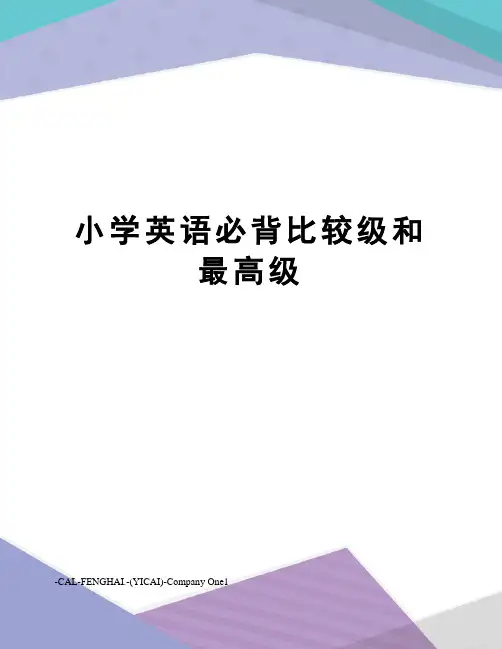
小学英语必背比较级和最高级-CAL-FENGHAI.-(YICAI)-Company One1比较级和最高级1.在形容词词尾加上“er”“est”构成比较级、最高级:bright(明亮的)—brighter—brightestbroad(广阔的)—broader—broadestcheap(便宜的)—cheaper—cheapestclean(干净的)—cleaner—cleanestclever(聪明的)—cleverer—cleverestcold(寒冷的)—colder—coldestcool(凉的)—cooler—coolestdark(黑暗的)—darker—darkestdear(贵的)—dearer—dearestdeep(深的)—deeper—deepestfast(迅速的)—faster—fastestfew(少的)—fewer—fewestgreat(伟大的)—greater—greatesthard(困难的,硬的)—harder—hardesthigh(高的)—higher—highestkind(善良的)—kinder—kindestlight(轻的)—lighter—lightestlong(长的)—longer—longestloud(响亮的)—louder—loudestlow(低的)—lower—lowestnear(近的)—nearer—nearestnew(新的)—newer—newestpoor(穷的)—poorer—poorestquick(快的)—quicker—quickestquiet(安静的)—quieter—quietestrich(富裕的)—richer—richestshort(短的)—shorter—shortestslow(慢的)—slower—slowestsmall(小的)—smaller—smallestsmart(聪明的)—smarter—smartestsoft(柔软的)—softer—softeststrong(强壮的)—stronger—strongestsweet(甜的)—sweeter—sweetesttall(高的)-taller-tallestthick(厚的)—thicker—thickestwarm(温暖的)—warmer—warmestweak(弱的)—weaker—weakestyoung(年轻的)—younger—youngest2.双写最后一个字母,再加上“er”“est”构成比较级、最高级:big(大的)—bigger—biggestfat(胖的)—fatter—fattesthot(热的)—hotter—hottestred(红的)—redder—reddestsad(伤心的)—sadder—saddestthin(瘦的)—thinner—thinnestwet(湿的)—wetter—wettestmad(疯的)—madder—maddest3.以不发音的字母e结尾的形容词,加上“r”“st”构成比较级、最高级:able(能干的)—abler—ablestbrave(勇敢的)—braver—bravestclose(接近的)—closer—closestfine(好的,完美的)—finer—finestlarge(巨大的)—larger—largestlate(迟的)—later—latestnice(好的)—nicer—nicestripe(成熟的)—riper—ripestrude(粗鲁的)—ruder—rudestsafe(安全的)—safer—safeststrange(奇怪的)—stranger—strangestwide(宽广的)—wider—widest wise(睿智的,聪明的)—wiser—wisest white(白的)—whiter—whitest4.以字母y结尾的形容词,把y改为i,再加上“er”“est”构成比较级、最高级:busy(忙碌的)—busier—busiestdirty(脏的)—dirtier—dirtiestdry(干燥的)—drier—driestearly(早的)—earlier—earliesteasy(容易的)—easier—easiestfriendly(友好的)—friendlier—friendliestfun—funnier—funniesthappy(开心的)—happier—happiesthealthy(健康的)—healthier—healthiestheavy(重的)—heavier—heaviesthungry(饿的)—hungrier—hungriestlazy(懒惰的)—lazier—laziestlucky(幸运的)—luckier—luckiestnaughty(调皮的)—naughtier—naughtiestnoisy(嘈杂的)—noisier—noisiestpretty(美丽的)—prettier—prettiestsilly(傻的)—sillier—silliestspicy(辣的)—spicier—spiciestthirsty(渴的)—thirstier—thirstiestugly(丑的)—uglier—ugliest5.双音节、多音节形容词,在单词前面加上“more”“most”构成比较级、最高级:afraid(害怕的)—more afraid—most afraidbeautiful(美丽的)—more beautiful—most beautifulcareful(仔细的)—more careful—most carefulcheerful(开心的)—more cheerful—most cheerfulcrowded(拥挤的)—more crowded—most crowdeddangerous(危险的)—more dangerous—most dangerousdelicious(美味的)—more delicious—most deliciousdifficult(困难的)—more difficult—most difficultexciting(令人兴奋的)—more exciting—most excitingexpensive(昂贵的)—more expensive—most expensivefamous(著名的)—more famous—most famoushard-working(勤奋的)—more hard-working—most hard-working helpful(有帮助的)—more helpful—most helpfulhonest(诚实的)—more honest—most honestimportant(重要的)—more important—most importantinteresting(有趣的)—more interesting—most interestingpolite(有礼貌的)—more polite—most politeterrible(可怕的)—more terrible—most terribletired(累的)—more tired—most tired6.不规则变化的形容词:bad(坏的)—worse—worstfar(远的)—farther—farthest (far—further—furthest)good(形容词好的)—better—bestwell(副词好的,身体好的)—better—bestill(病的)—worse—worstlittle(少的)—less—leastmany(形容可数多的)—more—mostmuch(形容不可数多的)—more—mostold(年老的)—older—oldest ( old—elder—eldest)。
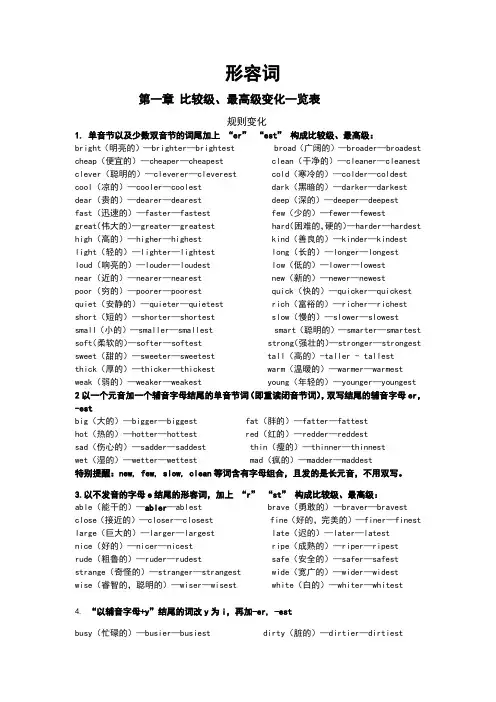
形容词第一章比较级、最高级变化一览表规则变化1.单音节以及少数双音节的词尾加上“er”“est”构成比较级、最高级:bright(明亮的)—brighter—brightest broad(广阔的)—broader—broadestcheap(便宜的)—cheaper—cheapest clean(干净的)—cleaner—cleanest clever(聪明的)—cleverer—cleverest cold(寒冷的)—colder—coldestcool(凉的)—cooler—coolest dark(黑暗的)—darker—darkestdear(贵的)—dearer—dearest deep(深的)—deeper—deepestfast(迅速的)—faster—fastest few(少的)—fewer—fewestgreat(伟大的)—greater—greatest hard(困难的,硬的)—harder—hardesthigh(高的)—higher—highest kind(善良的)—kinder—kindestlight(轻的)—lighter—lightest long(长的)—longer—longestloud(响亮的)—louder—loudest low(低的)—lower—lowestnear(近的)—nearer—nearest new(新的)—newer—newestpoor(穷的)—poorer—poorest quick(快的)—quicker—quickestquiet(安静的)—quieter—quietest rich(富裕的)—richer—richestshort(短的)—shorter—shortest slow(慢的)—slower—slowestsmall(小的)—smaller—smallest smart(聪明的)—smarter—smartestsoft(柔软的)—softer—softest strong(强壮的)—stronger—strongestsweet(甜的)—sweeter—sweetest tall(高的)-taller - tallest thick(厚的)—thicker—thickest warm(温暖的)—warmer—warmestweak(弱的)—weaker—weakest young(年轻的)—younger—youngest2以一个元音加一个辅音字母结尾的单音节词(即重读闭音节词),双写结尾的辅音字母er,-estbig(大的)—bigger—biggest fat(胖的)—fatter—fattesthot(热的)—hotter—hottest red(红的)—redder—reddestsad(伤心的)—sadder—saddest thin(瘦的)—thinner—thinnestwet(湿的)—wetter—wettest mad(疯的)—madder—maddest特别提醒:new, few, slow, clean等词含有字母组合,且发的是长元音,不用双写。
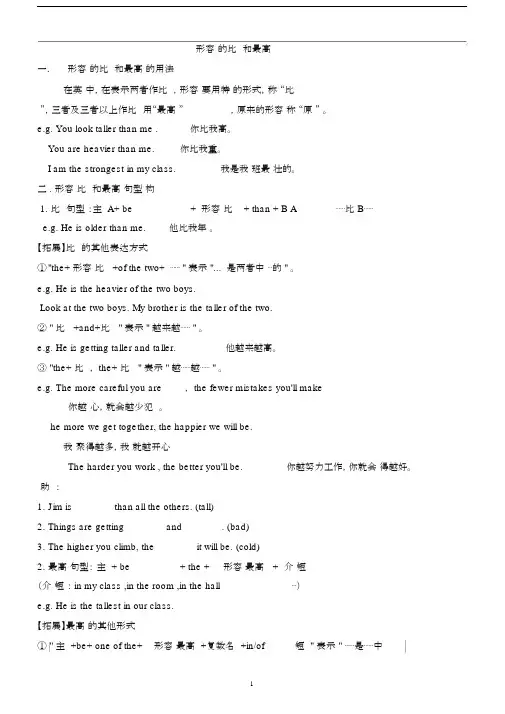
形容的比和最高一.形容的比和最高的用法在英中,在表示两者作比,形容要用特的形式,称“比”,三者及三者以上作比用“最高”,原来的形容称“原” 。
e.g. You look taller than me .你比我高。
You are heavier than me.你比我重。
I am the strongest in my class.我是我班最壮的。
二 . 形容比和最高句型构1. 比句型:主 A+ be+ 形容比 + than + B A⋯⋯比B⋯⋯e.g. He is older than me.他比我年。
【拓展】比的其他表达方式①"the+ 形容比 +of the two+ ⋯⋯ " 表示 "... 是两者中⋯的 " 。
e.g. He is the heavier of the two boys.Look at the two boys. My brother is the taller of the two.② " 比 +and+比 " 表示 " 越来越⋯⋯ " 。
e.g. He is getting taller and taller.他越来越高。
③ "the+ 比, the+ 比 " 表示 " 越⋯⋯越⋯⋯ " 。
e.g. The more careful you are,the fewer mistakes you'll make你越心,就会越少犯。
he more we get together, the happier we will be.我聚得越多,我就越开心The harder you work , the better you'll be.你越努力工作,你就会得越好。
助:1.Jim is _______ than all the others. (tall)2.Things are getting _______ and _______. (bad)3.The higher you climb, the _______ it will be. (cold)2. 最高句型:主 + be+ the +形容最高+介短(介短: in my class ,in the room ,in the hall⋯)e.g. He is the tallest in our class.【拓展】最高的其他形式① " 主 +be+ one of the+形容最高+复数名+in/of短"表示"⋯⋯是⋯⋯中最⋯⋯之一 "e.g. Beijing is one of the largest cities in China.②序数 +最高e.g. Hainan Island is the second largest island in China.助:1.The changjiang river is ____________________ (long) river in China.2. The Yellow River (Huang He) is ________________ (第二) river in China3.A. 形容的比和最高化构成原比最高tall taller tallestlong longer longest 音一般尾加 -er, -est old older oldestsmall smaller smallest 和以字母 e 尾的形容或副nice nicer nicest少, 直接加 -r,-st fine finer finest数large larger largest双以重音尾的形容big bigger biggest音或副 , 如末尾只有一个音hot hotter hottest 字母 , 双写字母 , 再加fat fatter fattest-er,-est thin thinner thinnest以“ 音字母 +y” 尾的形heavy heavier heaviest容或副,把 yi ,再 busy busier busiest加 -er,-est early earlier earliesteasy easier easiestB. 部分双音与多音的比在原之前加more, 最高在原之前加 most beautiful---more beautiful---most beautifulinteresting--- more interesting – most interestingdifficult--- more difficult – most difficultC. 不化的形容 :little / few -less–least good–better - bestbad/ill - worse–worst far-- farther/further—farthest/furthest many/much – more – moste.g. 比一下下列句子,悟原、比、最高的用法。
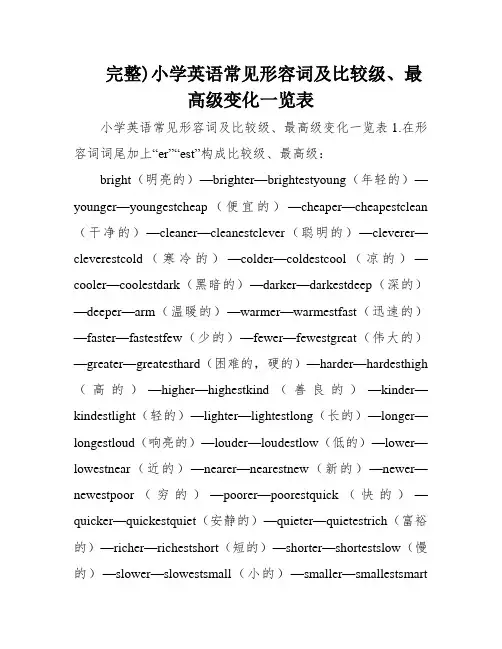
完整)小学英语常见形容词及比较级、最高级变化一览表小学英语常见形容词及比较级、最高级变化一览表1.在形容词词尾加上“er”“est”构成比较级、最高级:bright(明亮的)—brighter—brightestyoung(年轻的)—younger—youngestcheap(便宜的)—cheaper—cheapestclean (干净的)—cleaner—cleanestclever(聪明的)—cleverer—cleverestcold(寒冷的)—colder—coldestcool(凉的)—cooler—coolestdark(黑暗的)—darker—darkestdeep(深的)—deeper—arm(温暖的)—warmer—warmestfast(迅速的)—faster—fastestfew(少的)—fewer—fewestgreat(伟大的)—greater—greatesthard(困难的,硬的)—harder—hardesthigh (高的)—higher—highestkind(善良的)—kinder—kindestlight(轻的)—lighter—lightestlong(长的)—longer—longestloud(响亮的)—louder—loudestlow(低的)—lower—lowestnear(近的)—nearer—nearestnew(新的)—newer—newestpoor(穷的)—poorer—poorestquick(快的)—quicker—quickestquiet(安静的)—quieter—quietestrich(富裕的)—richer—richestshort(短的)—shorter—shortestslow(慢的)—slower—slowestsmall(小的)—smaller—smallestsmart(聪明的)—smarter—smarteststrong(强壮的)—stronger—eak(弱的)—weaker—weakestsweet(甜的)—sweeter—XXX (高的)-taller-tallestthick(厚的)—thicker—thickest2.双写末了一个字母,再加上“er”“est”组成比力级、第一流:big(大的)—bigger—biggestfat(胖的)—fatter—fattesthot(热的)—hotter—et(湿的)—wetter—XXX(瘦的)—thinner—thinnest3.以不发音的字母e末端的描述词,加上“r”“st”组成比力级、第一流:close(靠近的)—closer—closestfine(好的,圆满的)—finer—finestlarge(宏大的)—larger—largestlate(迟的)—later—latestnice(好的)—nicer—nicestsafe(平安的)—safer—safeststrange(奇特的)—stranger—ide(宽阔的)—wider—widest4.以字母y末端的描述词,把y改成i,再加上“er”“est”组成比力级、第一流:busy(繁忙的)—busier—busiestdirty(脏的)—dirtier—dirtiestdry(枯燥的)—drier—driestearly(早的)—earlier—earliesteasy(简单的)—XXX—easiestfriendly(友爱的)—XXX(好玩的)—funnier—XXX (高兴的)—happier—XXX(安康的)—XXX—XXX(重的)—heavier—heaviest1hungry(饿的)—hungrier—hungriestlazy(懒惰的)—lazier—laziestlucky(幸运的)—luckier—luckiestugly(丑的)—uglier—ugliestnoisy(嘈杂的)—noisier—noisiestpretty(美丽的)—prettier—prettiestsilly(傻的)—sillier—silliestthirsty (渴的)—thirstier—thirstiest5.双音节、多音节形容词,在单词前面加上“more”“most”构成比较级、最高级:afraid(害怕的)—more afraid—most afraidbeautiful(美丽的)—more beautiful—most beautifulcareful(仔细的)—more careful—most carefuldangerous(危险的)—more dangerous—most dangerousus(鲜味的)—more us—most usdifficult(艰巨的)—more difficult—most difficultexciting(令人兴奋的)—XXXXXX(昂贵的)—more XXXfamous(有名的)—more famous—most famoushard-working(用功的)—more hard-working—most hard-workingXXX(有帮助的)—more XXXhonest(诚实的)—XXXimportant(重要的)—XXXinteresting(有趣的)—more interesting—most interesting polite(有规矩的)—more polite—most politeterrible(恐怖的)—more XXXtired(累的)—more tired—most tired6.不划定规矩变革的描述词:bad(坏的)—worse—worstfar(远的)—farther—farthest (far—further—furthest) good(好的)—better—XXXill(病的)—worse—worstlittle(少的)—less—leastmany(多的)—more—mostmuch(多的)—more—mostold(大哥的)—older—oldest ( old—elder—eldest)well(好的,身材好的)—better—best。
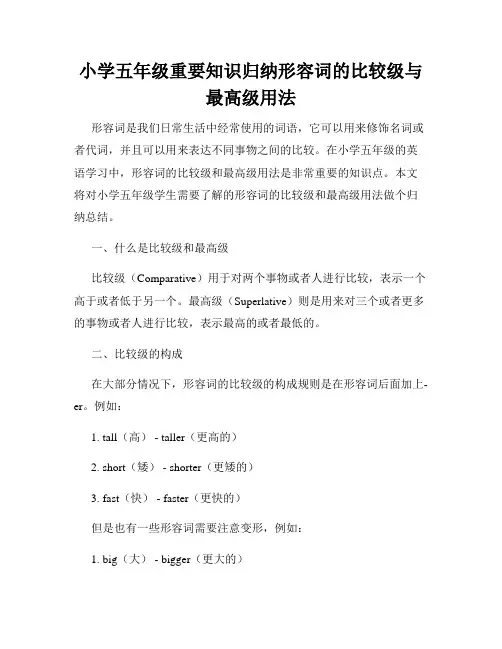
小学五年级重要知识归纳形容词的比较级与最高级用法形容词是我们日常生活中经常使用的词语,它可以用来修饰名词或者代词,并且可以用来表达不同事物之间的比较。
在小学五年级的英语学习中,形容词的比较级和最高级用法是非常重要的知识点。
本文将对小学五年级学生需要了解的形容词的比较级和最高级用法做个归纳总结。
一、什么是比较级和最高级比较级(Comparative)用于对两个事物或者人进行比较,表示一个高于或者低于另一个。
最高级(Superlative)则是用来对三个或者更多的事物或者人进行比较,表示最高的或者最低的。
二、比较级的构成在大部分情况下,形容词的比较级的构成规则是在形容词后面加上-er。
例如:1. tall(高) - taller(更高的)2. short(矮) - shorter(更矮的)3. fast(快) - faster(更快的)但是也有一些形容词需要注意变形,例如:1. big(大) - bigger(更大的)2. small(小) - smaller(更小的)3. hot(热) - hotter(更热的)三、最高级的构成最高级的构成规则是在形容词前添加最高级的标志词,例如:1. the tallest(最高的)2. the shortest(最矮的)3. the fastest(最快的)四、比较级和最高级的用法1. 比较级的用法:(1)用于两者之间的比较:- My dog is bigger than your dog.(我的狗比你的狗大)- This book is more interesting than that one.(这本书比那本书更有趣)(2)用于比较级后的 than 后面与之进行比较的事物或人:- Tom is taller than his brother.(汤姆比他的兄弟高)- The blue pen writes more smoothly than the black one.(这支蓝色的笔写得比这支黑色的笔更流畅)2. 最高级的用法:(1)用于三者或者三者以上的比较:- He is the tallest boy in our class.(他是我们班最高的男孩)- That is the smallest box in the store.(那是店里最小的盒子)(2)用于最高级前面的 the 后面与之进行比较的事物或者人:- Tom is the tallest boy in our class.(汤姆是我们班最高的男孩)- This is the most interesting book I have ever read.(这是我读过的最有趣的书)五、一些特殊的比较级和最高级形式有一些形容词的比较级和最高级形式是不规则的,需要特别记住,例如:1. good(好) - better(更好的) - the best(最好的)2. bad(坏) - worse(更坏的) - the worst(最坏的)3. little(小) - less(更少的) - the least(最少的)六、总结形容词的比较级和最高级用法是小学五年级英语学习中的重要知识点。
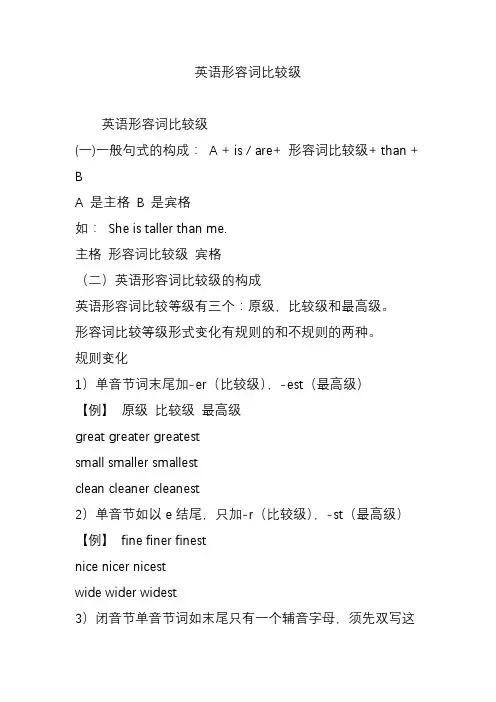
英语形容词比较级英语形容词比较级(一)一般句式的构成:A + is / are+ 形容词比较级+ than + BA 是主格B 是宾格如:She is taller than me.主格形容词比较级宾格(二)英语形容词比较级的构成英语形容词比较等级有三个:原级,比较级和最高级。
形容词比较等级形式变化有规则的和不规则的两种。
规则变化1)单音节词末尾加-er(比较级),-est(最高级)【例】原级比较级最高级great greater greatestsmall smaller smallestclean cleaner cleanest2)单音节如以e结尾,只加-r(比较级),-st(最高级)【例】fine finer finestnice nicer nicestwide wider widest3)闭音节单音节词如末尾只有一个辅音字母,须先双写这个辅音字母,再加-er(比较级),-est(最高级)【例】big bigger biggesthot hotter hottestred redder reddest 4)少数以-y,-er,ow,-ble结尾的双音节词,末尾加-er(比较级),-est(最高级)。
以-y结尾的词,如-y前是辅音字母,则变y为-i,再加-er和-est。
以-e结尾的词只加-r和-st。
【例】clever cleverer cleverestnarrow narrower narrowestable abler ablesteasy easier easiest5)其它双音节和多音节词皆在前面加单词more和most。
【例】careful more careful most carefuldifficult more difficult most difficultdelicious more delicious most delicious不规则变化原级比较级最高级good/well better bestbad worse worstmany/much more mostlittle less leastfar farther/further farthest/furthest注:有些形容词一般没有比较等级。
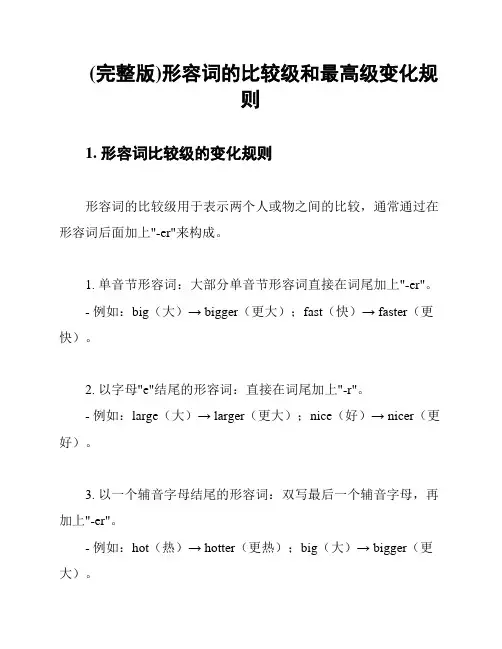
(完整版)形容词的比较级和最高级变化规则1. 形容词比较级的变化规则形容词的比较级用于表示两个人或物之间的比较,通常通过在形容词后面加上"-er"来构成。
1. 单音节形容词:大部分单音节形容词直接在词尾加上"-er"。
- 例如:big(大)→ bigger(更大);fast(快)→ faster(更快)。
2. 以字母"e"结尾的形容词:直接在词尾加上"-r"。
- 例如:large(大)→ larger(更大);nice(好)→ nicer(更好)。
3. 以一个辅音字母结尾的形容词:双写最后一个辅音字母,再加上"-er"。
- 例如:hot(热)→ hotter(更热);big(大)→ bigger(更大)。
4. 以"y"结尾的形容词:将"y"变为"i",再加上"-er"。
- 例如:happy(快乐)→ happier(更快乐);pretty(漂亮)→ prettier(更漂亮)。
2. 形容词最高级的变化规则形容词的最高级用于表示三个或三个以上的人或物中的某一最高水平,通常通过在形容词前面加上"the"和在形容词后面加上"-est"来构成。
1. 单音节形容词:大部分单音节形容词在词尾加上"-est"。
- 例如:big(大)→ the biggest(最大);fast(快)→ the fastest(最快)。
2. 以字母"e"结尾的形容词:在词尾加上"-st"。
- 例如:large(大)→ the largest(最大);nice(好)→ the nicest(最好)。
3. 以一个辅音字母结尾的形容词:双写最后一个辅音字母,再加上"-est"。
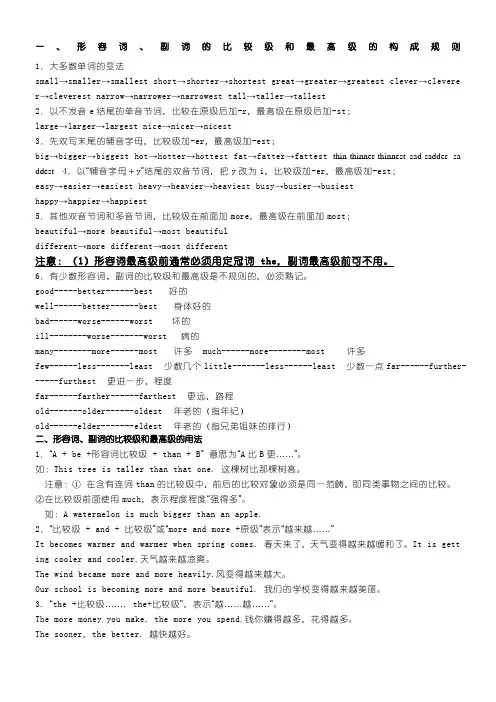
一、形容词、副词的比较级和最高级的构成规则1.大多数单词的变法small→smaller→smallest short→shorter→shortest great→greater→greatest clever→clevere r→cleverest narrow→narrower→narrowest tall→taller→tallest2.以不发音e结尾的单音节词,比较在原级后加-r,最高级在原级后加-st;large→larger→largest nice→nicer→nicest3.先双写末尾的辅音字母,比较级加-er,最高级加-est;big→bigger→biggest hot→hotter→hottest fat→fatter→fattest thin-thinner-thinnest sad-sadder--sa ddest 4.以“辅音字母+y”结尾的双音节词,把y改为i,比较级加-er,最高级加-est;easy→easier→easiest heavy→heavier→heaviest busy→busier→busiesthappy→happier→happiest5.其他双音节词和多音节词,比较级在前面加more,最高级在前面加most;beautiful→more beautiful→most beautifuldifferent→more different→most different注意:(1)形容词最高级前通常必须用定冠词 the,副词最高级前可不用。
6.有少数形容词、副词的比较级和最高级是不规则的,必须熟记。
good-----better------best好的well------better------best身体好的bad------worse------worst坏的ill--------worse-------worst病的many--------more------most许多 much------more--------most许多few------less-------least少数几个little-------less------least少数一点far------further------furthest更进一步,程度far------farther------farthest更远,路程old-------older------oldest年老的(指年纪)old------elder-------eldest年老的(指兄弟姐妹的排行)二、形容词、副词的比较级和最高级的用法1.“A + be +形容词比较级 + than + B”意思为“A比B更……”。
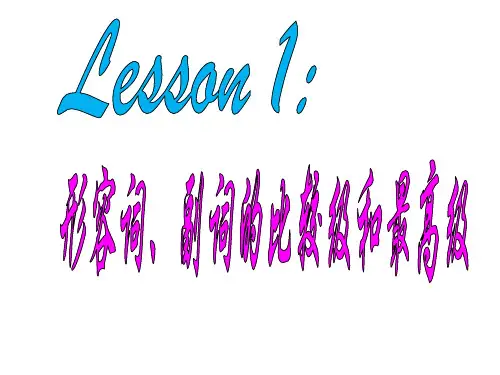
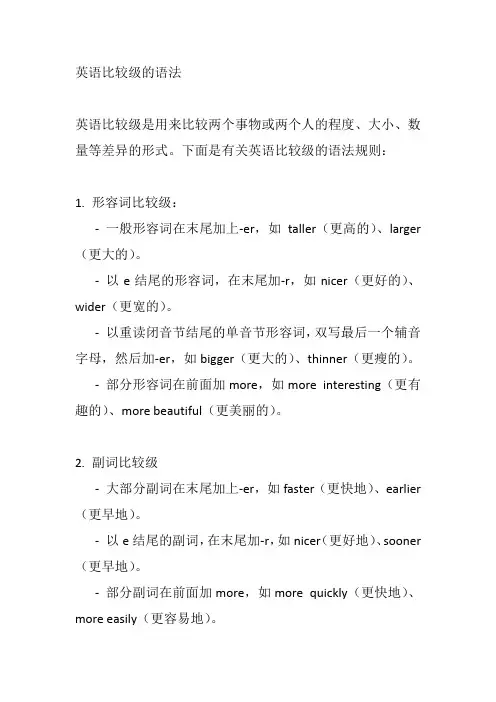
英语比较级的语法英语比较级是用来比较两个事物或两个人的程度、大小、数量等差异的形式。
下面是有关英语比较级的语法规则:1. 形容词比较级:-一般形容词在末尾加上-er,如taller(更高的)、larger (更大的)。
-以e结尾的形容词,在末尾加-r,如nicer(更好的)、wider(更宽的)。
-以重读闭音节结尾的单音节形容词,双写最后一个辅音字母,然后加-er,如bigger(更大的)、thinner(更瘦的)。
-部分形容词在前面加more,如more interesting(更有趣的)、more beautiful(更美丽的)。
2. 副词比较级-大部分副词在末尾加上-er,如faster(更快地)、earlier (更早地)。
-以e结尾的副词,在末尾加-r,如nicer(更好地)、sooner (更早地)。
-部分副词在前面加more,如more quickly(更快地)、more easily(更容易地)。
3. 不规则比较级:-好/好地:better(更好的)/well(更好地)-多:more(更多的)/much(更多地)-少:less(更少的)/little(更少地)-远:farther/further(更远的)4. 比较级的用法:-形容词比较级用于比较两个事物或人的性质、特征,例如"The car is faster than the bike."(这辆车比自行车快)。
-副词比较级用于比较两个动作或状态的程度,例如"She sings more beautifully than her sister."(她唱得比她姐姐更美妙)。
需要注意的是,有些形容词和副词的比较级没有明显的规则,需要通过记忆和学习来掌握。
同时,比较级也可由"than"引导的从句来进行表达,例如"He is taller than I am."(他比我高)。
(完整版)英语单词比较级英语比较级是英语语法中的一个重要部分,用于比较两个或多个事物的性质、程度或数量。
比较级通常由原级(即单词的基本形式)加上后缀er或more构成。
下面是一些常见的英语单词比较级:1. 形容词比较级(1)规则变化大多数形容词的比较级通过在原级后加上er构成。
例如:tall taller(高的)small smaller(小的)hot hotter(热的)cold colder(冷的)happy happier(快乐的)sad sadder(悲伤的)(2)不规则变化一些形容词的比较级是不规则的,需要特别记忆。
例如:bad worse(坏的)many more(许多的)much more(大量的)little less(少的)few fewer(少数的)2. 副词比较级副词的比较级通常在原级后加上er构成。
例如:fast faster(快地)slowly more slowly(慢地)carefully more carefully(仔细地)well better(好地)badly worse(坏地)3. 比较级的用法(1)形容词和副词的比较级通常与than连用,构成比较句。
例如:He is taller than me.(他比我高。
)She runs faster than him.(她比他跑得快。
)(2)在比较级前可以使用一些修饰词,如a little, much, far 等,表示比较的程度。
例如:This book is a little more interesting than that one.(这本书比那本更有趣。
)She sings much better than her sister.(她唱歌比她姐姐唱得好多了。
)She is the tallest girl in our class.(她是我们班最高的女孩。
)He runs the fastest in our school.(他是我们学校跑得最快的。
形容词的比较级形式
形容词的比较级形式是用于比较两个事物之间的程度、大小或质量等差异的形式。
一般情况下,形容词的比较级在原词基础上加上-er 或者在前面加上more。
下面是一些例子:
1.原级:大-比较级:更大-最高级:最大
2.原级:快-比较级:更快-最高级:最快
3.原级:高-比较级:更高-最高级:最高
4.原级:漂亮-比较级:更漂亮-最高级:最漂亮
5.原级:聪明-比较级:更聪明-最高级:最聪明
除了使用比较级的形式来表示两者之间的比较之外,我们还可以使用增强语气来强调两者之间的差异。
比如:
1.更比较的形容词:完全、绝对、远远、大大等
2.比较级带有强调:更多、更好、更少、更强等
此外,有一些形容词的比较级形式是不规则的,需要特别记忆,例如:
1.原级:好-比较级:更好-最高级:最好
2.原级:少-比较级:较少或更少-最高级:最少
3.原级:远-比较级:较远或更远-最高级:最远
在实际应用中,可以根据需要使用适当的比较级形式来表达差异和强调。
比较级& 最高级一、形容词的比较级1、形容词比较级在句子中的运用:两个事物或人的比较用比较级,比较级后面一般带有单词than。
比较级的句子结构通常是:什么 + 动词be (am , is , are ) + 形容词比较级 + than(比)+ 什么 ,如:I'm taller and heavier than you. (我比你更高和更重。
)An elephant is bigger than a tiger. (一只大象比一只老虎更大。
)比较级前面可以用more, a little 来修饰表示程度。
than后的人称代词用主格(口语中可用宾格)。
2.形容词加er的规则:① 一般的直接在词尾加er ,如 tall - taller , strong - stronger ,② 以e结尾的,直接加r ,如 fine - finer ,③ 以辅音字母加y结尾的,先改y为i再加er,如funny - funnier④以一个元音字母和一个辅音字母结尾,双写最后的字母再加er,如big--bigger, thin--thinner ,hot–-hotter, sad--sadder,fat—fatter3.不规则形容词比较级:good--better,beautiful--more beautiful, expensive--more expensive二、副词的比较级1.形容词与副词的区别 (有be用形,有形用be;有动用副,有副用动)⑴在句子中形容词一般处于名词之前或be动词之后。
⑵副词在句子中最常见的是处于实义动词之后。
2.副词比较级的变化规则基本与形容词比较级相同☆注意☆1、比较的两者应该是互相对应的可比较的东西。
典型错误:My hair is longer than you.(我的头发比你更长。
)比较的两者是我的头发、你(整个人),那么比较的对象就没有可比性。
应该改为:My hair is longer than yours. 或My hair is longer than your hair.2、如果比较的两者是一样的时候,我们会用as…as…这个词组。
形容词比较级和最高级的形式一、形容词比较级和最高级的构成形容词的比较级和最高级变化形式规则如下构成法原级比较级最高级①一般单音节词末尾加er 和est strong stronger strongest②单音节词如果以e结尾,只加r 和st strange stranger strangest③闭音节单音节词如末尾只有一个辅音字母,须先双写这个辅音字母,再加er和est sadbighot sadderbiggerhotter saddestbiggesthottest④少数以y,er(或ure),ow,ble结尾的双音节词,末尾加er和est(以y结尾的词,如y前是辅音字母,把y变成i,再加er和est,以e结尾的词仍只加r和st) angryCleverNarrowNoble angrierCleverernarrowernobler angriestcleverestnarrowestnoblest⑤其他双音节和多音节词都在前面加单词more和most different moredifferent mostdifferent1) The most high 〔A〕mountain in 〔B〕the world is Mount Everest,which is situated 〔C〕in Nepal and istwenty nine thousand one hundred and fourty one feet high 〔D〕 .2) This house is spaciouser 〔A〕than that 〔B〕white 〔C〕one I bought in Rapid City,South Dakota 〔D〕last year.3) Research in the social 〔A〕sciences often proves difficulter 〔B〕than similar 〔C〕work in the physical 〔D〕sciences.二、形容词比较级或最高级的特殊形式:1. 三个或三个以上音节的形容词只能加more和most只能说more beautiful而不能说beautifuller; 只能说the most beautiful而不能说beautifullest。
形容词的比较级定义:形容词是用来修饰物体的形状,大小,长度,属性,特点等,位于名词的前面。
而形容词的比较级表示两者间的比较。
结构:1.“A + be +形容词比较级+ than + B” 意思为“A比B更……”如:This tree is taller than that one. 这棵树比那棵树高。
注意:①在含有连词than的比较级中,前后的比较对象必须是同一范畴,即同类事物间的比较。
②在比较级前面使用much,表示程度“强得多”。
如:A watermelon is much bigger than an apple.西瓜比苹果大得多。
③ very, quite一般只能修饰原级,不能修饰比较级。
2.“become + 形容词比较级+ and + 形容词比较级”是“变得越来越……”的意思,and连接同一个形容词的比较级。
如:It becomes warmer and warmer when spring comes.春天来了,天气变得越来越暖和了。
注:表示“越来越……”时,若比较级是“原级+ er”构成的,则常用“比较级+ and + 比较级”形式;若比较级是“more + 原级”构成的,需用“more and more + 原级形式”。
如:Our school is becoming more and more beautiful. 我们的学校变得越来越美丽。
3.在含有or的选择疑问句中,如果有两者供选择,前面的形容词要用比较级形式。
如:Who is taller, Tim or Tom? 谁更高,Tim还是Tom?形容词比较级构成规律1.一般情况下,比较级在后面加;如:small → smaller short → shorter2.在重读闭音节(即:辅音+元音+辅音)中,先双写末尾的辅音字母,比较级加-er,如:big →bigger hot →hotter3.以不发音e结尾的单音节词,比较在原级后加;如:large →larger nice →nicer4.以“辅音字母+y”结尾的双音节词,,比较级加;如:easy →easier heavy →heavier5.多数多音节词,比较级在前面加;如:beautiful → more beautiful different → more different6.有少数形容词的比较级是不规则的,必须熟记。
如:good/well →_ bad→_ old→many/much→little→far →专项练习:一、写出下列形容词的比较级 old__________ young________ tall_______ long________ short________ strong________ big________ small_______ fat_________ thin__________ heavy______ light________ nice_________ good_________ beautiful__________________ low__________ high_________ slow_______ fast________ 二、翻译句子: 1、谁比Jim年纪大?是你。
________ is _________than Jim?________ are 2、谁比David更强壮?是Gao Shan. ________ _________ than David? Gao Shan ________. 3、谁的铅笔更长,他的还是她的?我想是她的。
_________ pencil is _________,______or________?________is,I think. 4、谁的苹果更重,你的姐姐的还是你的弟弟的?我的弟弟的。
_________ apples ________ ________,your _______ or your _______? My ____________ ___________. 5、你和你的叔叔一样高吗?是的。
_________ ________as _________as your uncle?Yes,I am. 6、他和他的朋友Jim一样年轻。
He _______ as __________ as ________ ________ Jim. 7、她和她的双胞胎哥哥一样胖吗?不,她比他瘦。
________ ________ as _________ as______ twin _______? No, _________ _________ than him. 8.Yang Ling每天睡得比SuYang晚。
Yang Ling ________ to _______ ________ than Su Yang every day. 9.我跳得和Mike一样远。
I _________ as _______ as Mike. 10.Tom比你跑得快吗?不是的,他和我跑得一样快。
____ Tom _____ _____ than you?No,he _______. He_____ as_____ as_____. 11.多做运动,你会更强壮。
________ more exercise,you’ll ________ _________ soon. 12.我的科学很好,但是语文不好。
I ______ ________ at Science.But I don’t _________ well in Chinese. 13. 你放风筝比王兵放得高吗?不,我比他放得低。
____you_______the kite_____than Wang bing?No,I______it _____than___. 14.我喜欢游泳。
我所有的朋友都游得比我慢。
I like_______.All my______ _______ _______than me.形容词的最高级定义:形容词、副词的最高级形式主要用来表示三者或三者以上人或事物的比较,表示“最……”的意思。
结构:三者或三者以上物体比较用最高级,最高级通常在词尾加est.句子中有表示范围的词或短语。
如:of the three, in our class等等。
He is the tallest in our class. 他在我们班里是最高的。
注意:形容词最高级前一定要有定冠词the,而副词最高级前则不需要。
形容词最高级构成规律:1.一般情况下,最高级在后面加;如:small → smallest short → shortest2.在重读闭音节(即:辅音+元音+辅音)中,先双写末尾的辅音字母,,最高级加-est;如:big → biggest hot → hottest3.以不发音e结尾的单音节词,最高级在原级后加;如:large → largest nice → nicest4.以“辅音字母+y”结尾的双音节词,,最高级加;如:easy → easiest heavy → heaviest5.多数多音节词,最高级在前面加;如:beautiful → most beautiful different → most different6.有少数形容词、副词的比较级和最高级是不规则的,必须熟记。
如:good→bad →old →many/much →little →far →注意: 形容词最高级前一定要有the, 而副词最高级则不需要。
总结规则变化构成法原级比较级最高级单音节词+er/est short shorter shortestcoldcolder coldest wide wider widest 以不发音e 结尾的词+r/stlargelarger largest big bigger biggest 单个辅音字母结尾的重读闭音节词,双写末尾辅音字母+er/esthot hotter hottest heavy heavier heaviest 以辅音字母+y 结尾的词,变y 为i+er/estbusy busier busiest important more important most important 多音节词在前面+more/mostbeautifulmore beautifulmost beautiful不规则变化专项练习:一、写出下列形容词的最高级。
口诀原级比较级最高级口诀原级比较级最高级两多many/ much more mostelder(家庭中表长幼)eldest两好good/ wellbetterbest一老oldolder (岁数大,东西旧)oldest两坏病bad/badly/ill worse worstfarther(距离远)farthest一少littlelessleast远距离farfurther (程度深,深入)furthest3.tall16.dark32.beautiful4.young19.big34.expensive 6.strong20.thin35.important9.high21.hot36.differentrge39.bad/ill 12.high24.heavy40.far14.cheap26.easy41.old15.bright29.pretty30.funny二、单项选择1. The whale is the ( ) animal.A. heavyB. heavierC. heaviestD. ligthest2. ( ) hair is the longest?A. WhoB. WhoseC. WhomD. What3. The giraffe is the ( ) animal.A. tallestB. smallerC. tallD. smallest4. Ruby is the ( ) dancer.A. bestB. goodC. betterD. bestest5. Josh is the ( )at singing.A. badB. goodC. worstD. better课后作业一、根据句意填入单词的正确形式。
1.My brother is two years _________ (old) than me.2. Is your sister _________ (young) than you? Yes, she is.3. Who is __________ (thin),you or Helen? Helen is.4. Whose pencil-box is _________ (big), yours or hers? Hers is.5.Ben jumps ________ (high) than some of the boys in his class.6.Does Nancy sing __________ (well) than Helen? Yes, she does.7.My eyes are __________(big) than hers.8.Which is __________ (heavy), the elephant or the pig?9.Who gets up ________ (early), Tim or Tom?10.Do the girls get up_______(early) than the boys? No, they______.11.Jim runs _____ (slow). But Ben runs _____ (slow).二、选择。